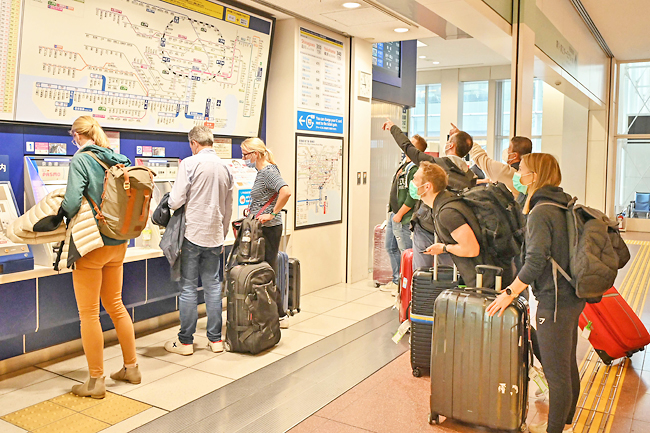TOKYO (AFP) – Japan re-opened its doors to tourists yesterday after two-and-a-half years of COVID-19 restrictions, with officials hoping an influx of travellers enticed by a weak yen will boost the economy.
By mid-morning, tourists from Israel, France and Britain were already pouring in, including Chris Irwin, 38, on his first trip to Japan.
“We have always wanted to come to Japan, and it seemed like the stars just aligned,” said Irwin, who arrived at Haneda airport from Britain with his wife.
Adi Bromshtine, a 69-year-old retiree from Israel, said she had been “planning before COVID and waiting and waiting” for the chance to visit Japan. “It’s a long, long dream come true,” she told AFP.
Japan slammed its borders shut early in the pandemic, at one point even barring foreign residents from returning, and has only recently begun cautiously re-opening.
In June, it began allowing tourists to visit in groups accompanied by guides, a requirement that was further relaxed to include self-guided package tours.
From yesterday, visa-free entry resumed for travellers from 68 countries and territories.

Japan also lifted a cap on the number of arrivals and ended the package tour requirement.
Tourists must still present either proof of vaccination or a negative coronavirus test taken three days before departure. In 2019, a record 31.9 million foreign visitors came to Japan, putting the country on track for its goal of 40 million by 2020, when Tokyo was supposed to host the Summer Olympics.
But in 2021, the figure plummeted to just 250,000.
In Japan, tourists will find a country that is still adhering to many of the health guidelines that helped it keep pandemic deaths to around 45,500, far lower than many other developed economies.
Masks are ubiquitous, and though not mandated by law, Parliament is set to pass legislation allowing hotels to deny service to customers who refuse to wear one or flout other health rules.
Masks are worn not only indoors and on public transport, but outdoors as well, despite the government saying they are not necessary outside in uncrowded settings.
There is hand sanitiser at the entrance of most businesses, and plastic dividers are still often used in restaurants.
Many arriving tourists seemed unfazed by the rules though.
“We’re more excited to see Japan than we will be annoyed by the masks, so we’ll be fine with it,” said British traveller Irwin.
Another major change for tourists will be the weakness of the yen, which is hovering around 145 to the dollar, a level not seen for two decades. The government has already had to intervene once to prop up the currency, and government spokesman Hirokazu Matsuno yesterday said officials are hoping rebounding tourism “will lead to recovery after the COVID pandemic and the revitalisation of communities”.
There is certainly no shortage of demand, according to Antoine Chanthavong, of Paris-based travel agency Destination Japan.
Since the re-opening announcement, “we’ve been absolutely drowning, we don’t have enough time to deal with all the requests”, he told AFP. Japanese carrier ANA has said reservations for international flights to the country surged five-fold after the re-opening was announced.
For now, tickets are not coming cheap, with fuel prices soaring and airlines forced to take circuitous routes to avoid Russian airspace.
Itay Galili, a 22-year-old student arriving from Israel, said he wasn’t put off by the cost.
“As soon as I heard it was going to re-open on the 11th, I started planning. Tickets were expensive. But no price is too heavy,” he told AFP.
For all the rebound in demand though, there is little expectation that tourist numbers will reach their 2019 levels. Before the pandemic, travellers from Hong Kong and mainland China made up 37 per cent of all foreign visitors to Japan, and 44 per cent of tourism income.
But tough COVID restrictions in China make it unlikely visitors from there will be flocking back to Japan anytime soon.







